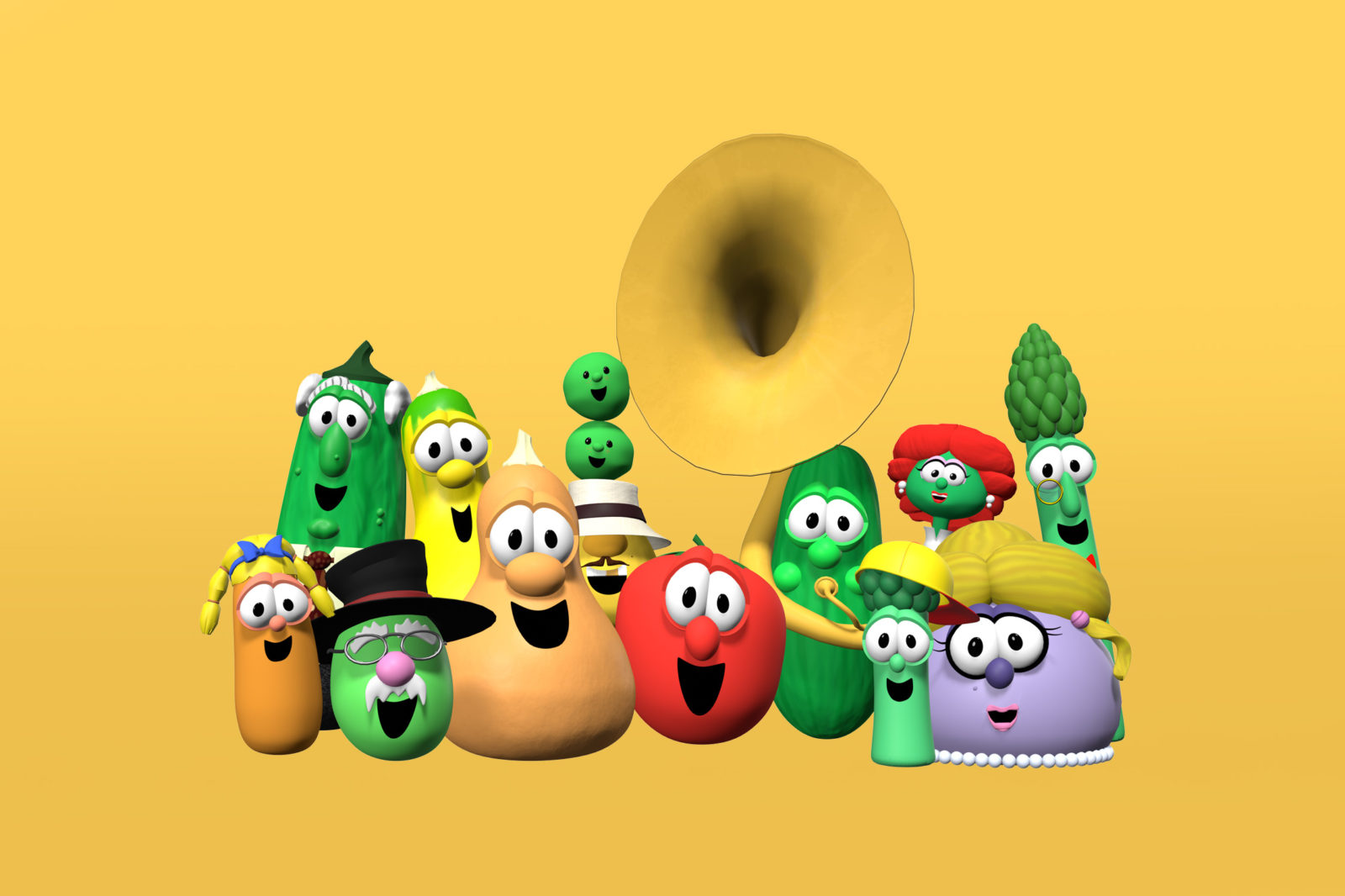
Imagine you’re Phil Vischer. It’s the early ‘90s — the era of Nirvana, AOL and Super Nintendo. The internet is still in its infancy, but people are getting excited. When people hear “Amazon” and “Apple” they think of a river and a fruit. The Simpsons is good.
And into all this, you’re preparing to launch your Big Idea. Computer animation remains a novelty, but you’ve got a knack for it, a good head for stories and an interest in teaching kids about the Bible. You start throwing together some character designs for a kid’s show. RAM is limited, so you’re trying to come up with something simple and straightforward. A talking candy bar maybe? Your wife says kids’ parents might not like that. Why not go a healthier route? VeggieTales is born.
But then when you run the idea by your mom, you hit a snag — one that would shape VeggieTales, its characters and its world forever.
You can’t show Jesus in VeggieTales. Moreover, none of the vegetables can be shown to have a “redemptive relationship with God.” This is real, confirmed in 2002 by TIME Magazine.
In other words, Bob, Larry and the gang can point kids toward Jesus. They can describe the endless love of God and perfect peace of His saving grace. But they cannot enter into it themselves. Salvation is saved for the crown of God’s creative work alone, and they are just vegetables.
That, in any case, was the rule laid down by Vischer’s mom Scottie Mae, who has a PhD in Christian Education and certainly knows what she’s talking about. She gave her son the twin ground rules for his VeggieTales against letting the veggies themselves become Christians or depicting Jesus as a vegetable and Big Idea stuck to them. You’ll note that while VeggieTales recreates many Bible stories over the course of its run, it stays out of the New Testament and, so, relatively Jesus-free.
This fact has lived in my mind rent free since I stumbled across it and Vischer himself confirmed it. On the one hand, it makes sense. However you feel about the appropriateness of depicting Jesus as a vegetable, there’s no doubt church audiences would get mad at their kids watching Vegetable Jesus. Vischer dodged a bullet there.
But then I think about Bob and Larry telling kids about the magnificence of grace that they themselves know only secondhand, like the very angels themselves. Think of the wrap-up, with Bob telling kids, “God made you special and He loves you very much.” Made you special. Loves you very much. Always “you.” Never “us.”
I feel like I’m losing my mind. What sort of cinematic universe is this where it’s easier to imagine talking, thinking, feeling vegetables than it is to imagine God might love those vegetables? Moreover, why do these vegetables appeal to Christian morality in tales like Where’s God When I’m S-S-Scared? when God’s salvific plan does not apply to them at all? Isn’t moral anarchy the obvious philosophical conclusion for the VeggieTales pals?
But even that doesn’t make any sense. Think about the theological Pandora’s box kicked open by Big Idea kicked here, if you dare. The VeggieTales vegetables love and are capable of being loved! Junior Asparagus is shown to be a member of a family, who themselves reflect God’s own love in their devotion to each other. Bob and Larry’s friendship, strained though it may sometimes be by Larry’s dimwittedness, is nevertheless a testament to the kindness of God being manifested in the hearts of His children. How then could the VeggieTales gang not be included in God’s redemptive plan?
Come to think of it, even if Jesus is not actually depicted as a vegetable in VeggieTales, are we the Church not supposed to be Jesus to the rest of the world? Aren’t the vegetables acting as the hands and feet of Jesus? So in a way, the rules are a spiritual impossibility.
Since we’re already this far down the rabbit hole, let’s tumble just a little further. Vischer’s mother has a PhD in Christian education. They don’t just hand those things out for fun. We must presume she saw the spiritual fallacies in her own set of rules. Is it possible that she was playing a game of three-dimensional chess against her own son?
You’re Phil Vischer. It’s the early 90s. You’ve got a gift for computer animation and storytelling, and you want to use those gifts to teach kids about the Bible. Your mother admires your heart and your drive, but she also knows the hard road ahead. She wants you to avoid simplistic moralizing and cutesy flannelgraph lessons. She wants you to get to the good stuff.
So she gives you some rules, ostensibly under the guise of keeping VeggieTales safe for theological watchdogs but perhaps with another, albeit hidden meaning, intended to teach a deeper truth. The wanton chaos of life without salvation. The invisible presence of Jesus over all our lives, even when He is bodily absent. These are not the sorts of lessons Bob the Tomato or Archibald Asparagus could get into without covering some pretty heady, seminary-level theological mumbo-jumbo. But it could be illustrated with some subtle limitations — limitations that actually open you up to higher theological truths.
You’re Phil Vischer, reading this now. Is your third eye open yet?






















